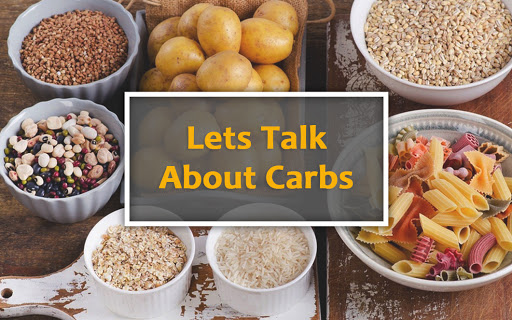
/div>
When trying to lose weight, many people cut out carbs. But this is a huge misconception. Thanks to diets like Atkins and Ketogenic diets, many of us have started to fear eating carbs. But the science behind carbohydrates is actually very complex, and demonizing an entire food group is not wise. Refined and complex carbs are very different, and it’s important to distinguish between the two.
It is possible to eat carbs and lose weight, you just need to know the trick:
1. Eat the right carbs
Let’s take for example potato, everyone’s favorite, this veggie gives you nutrition and has low energy density. On the other hand, French fries are deep fried and obviously an unhealthy way of cooking the potatoes. They should either be boiled or sautéed.
All ‘Low Carb’ diets are not Ketogenic. Low carb diets should target 150-200gm carbs per day. These carbs should come from complex sugars like fibrous fruits and veggies. As against this, a Ketogenic diet provides around 20-50gms carbs per day only and most of the energy is obtained from a high content of fat. It leads to a state of ketosis which is highly beneficial for people with certain diseases like epilepsy, diabetes, metabolic syndrome, or obesity. However, this extreme form of carb-restriction is not the only way to do a ‘low-carb’ diet.
2. Not all carbs are unhealthy sugar
There are many different types of sugars. Simple sugars include glucose, fructose, and galactose. Starch contained in grains and veggies gets broken down into glucose in the digestive tract. However, the sugar in a vegetable is not the same as that of a candy bar which contains sucrose (glucose+fructose). Thus, where as table sugar contains half glucose-half fructose, starch is only glucose. A balanced diet with portion control and complex carbohydrates can work well for weight loss.
3. Low Carbs diet can lead to weight gain
When following a low-carb diet, many people turn to foods that are high in fat and calories – even the good fat in too large a portion can cause a problem with weight gain. Portion sizes are primarily important no matter what diet you follow. Many low-carb foods can be fattening, especially for people who are prone to binge eating and have a history of fad diets.
4. Combo of energy and fibre
Carbs also contain fibre which our bodies can’t digest – Deeply understand; Fibre actually gets to the bacteria in the intestine, which has the enzymes to digest it and can turn it into beneficial compounds. That means fibre is essential for a healthy gut, which has been linked to maintaining a healthy weight. Some studies have even shown that fibre, especially soluble fibre (like those found in oats), can lead to weight loss and improved cholesterol
Aim for a mix of vegetables and whole grains in your diet to boost fibre consumption and drink plenty of water.
5. Carbs make you happy
It is commonly seen that people staying away from carbs have mood swings, trouble in concentrating and get easily frustrated. The simple answer is carbs help in creating a happy hormone called Serotonin. Tryptophan is an important amino acid and is the precursor of Serotonin. It cannot cross the brain’s blood barrier and needs carbs to help it cross over. Also, Tryptophan converts to serotonin and serotonin to melatonin, which is involved in our sleep cycle. Therefore, carbs make you happy and help you sleep, both of which are important factors for weight loss.
6. Cutting carbs is not sustainable
People observe some amount of weight loss in the initial phase of carb restriction. The question however is, can you do without it for lifetime? The answer is a big no. We need to be sensible enough to pick on the habit of clean eating and adapting lifestyle changes.
If you want to lose weight, look at portion control, a diet that is tailored to your needs, and up your exercise so that as a simple equation you’re burning off more calories that you eat.
A good day obviously begins with a good morning which in turn relies a lot on our morning chores. Topping that list is a light tummy and how we wish it could be as easy as brushing teeth. Alas! It’s not the case with a lot of us, for whom every morning brings with it that big question – Will it be a smooth transit today? CONSTIPATION is becoming an increasingly growing menace in our lives, but in most cases, we have ourselves to blame. Faulty dietary habits, sedentary lifestyle, lack of exercise and stress are few common reasons to blame. However, wouldn’t it be wise to stop complaining at some point and take charge of our own health. That’s exactly what we want to encourage you to do.
Food habits/diet tips/home remedies for constipation
1) Water is an important constituent of the stools. Insufficient intake can lead to hardening of stools and delay the transit time. Drink at least 8 to 10 glasses (2.5 to 3 liters) of water per day. It is especially beneficial to have 1-2 glasses of warm water soon after waking up as it helps in initiating peristalsis.
2) Include 5 to 6 servings of fruits and vegetables in the diet daily as they are an excellent source of fiber. Fiber, soluble as well as insoluble, is responsible for the bulk and binding of the stools. Whole fruit (not juiced) and raw vegetables in the form of salads are better. One should ensure sufficient water intake along with fiber intake on a daily basis to prevent constipation. Beans are also an excellent source of fiber.
3) Replace refined carbohydrates with whole grain cereals. Examples of refined carbohydrates are sugar, refined wheat flour and their products. Excess of these, disturbs the osmotic balance in the digestive system. Some good examples of whole grain cereals are oats, brown rice, whole wheat, etc. which contain fiber as well as B complex vitamins.
4) Probiotics are foods containing beneficial bacteria which are naturally present in the intestines. They help maintain a healthy gut environment. Consuming probiotic foods such as fresh curd/yogurt and buttermilk daily can help boost gut immunity and health and thus reduce risk of digestive disorders.
5) Go natural! Avoid processed, preserved, packaged food items as far as possible. Freshly prepared, home-made food items are the safest and most nutritious to consume. The traditional Indian diet (when cooked in minimal oil) is well balanced.
6) Super foods are foods which are especially beneficial for health and well-being. These foods contain unique substances which may have protective effect against various diseases. Some of the super foods for the digestive system are flax seeds, chia seeds, turmeric and cow’s ghee.These simple changes when combined with moderate exercise can help in common constipation. However, if constipation does not improve with these measures (lasts more than 6weeks) , it’s best to take an expert’s opinion. Conditions like Obstructed Defecation Syndrome can cause Chronic Constipation and need a Proctologist’s attention.
Not everyone understands the importance of Nutrition until it is to take heavy doses of medicines or avail medicinal management of any type for their ailment. Easily available and ready to eat items are bought over the counter that not only ruin one’s health but also instigate addiction to such unhealthy products that have almost nil nutrition value. The needs of the patient come first, with this belief Healing Hands Clinic contributes to the health and well being by providing the best care to every patient through integrated clinical practice and experience.
Dr. Ashwin Porwal, founder of Healing Hands Clinic introduces a new world of advanced treatment options for Constipation, Piles, Hernia, Fistula and other Ano Rectal diseases. Healing Hands Clinic not only encourages patients to eat fresh & healthy products but also provides knowledge about Nutrition &its effects with customized counseling sessions designed keeping in mind the individual’s daily routine. A high fiber diet with plenty of liquids aid the patient to experience complete elimination & painless defecation.
Constipation is generally described as having fewer than three bowel movements a week. If treatment for constipation is not done on time it may lead to chronic constipation. Chronic constipation is infrequent bowel movements or difficult passage of stools that persists for several weeks or longer. To be more specific, if still not taken care, constipation contributes to Piles (haemorrhoids) hence treatment for constipation on time is very necessary. Piles (Haemorrhoids) are painful, swollen veins in the anus and rectum which might trouble you during your pregnancy.
Many people avoid speaking about such issues/problems which they suffer from due to shyness, which is a human tendency. But don’t be a silent sufferer & get consulted to piles doctors as soon as you start observing changes in your daily bowel habit. There are many home remedies also available for constipation treatment. Are you aware of effectiveness of water in treatment of constipation? Water is very necessary to overcome constipation problem. The main problem of constipation is hard stools due to fewer intakes of fiber food or liquids or irregular eating habits. Water is important for your digestion. It keeps the food you eat moving along through your intestines and it keeps your intestines smooth and flexible, too. The more fluid intake the more is hard stools soft. Fruit and vegetable juices, clear soups, and herbal teas are also good sources of fluids. Over all this one point that an individual must understand is extra fluids help keep the stool soft and easy to pass, but drinking more liquids does not cure constipation.
Therefore, get consulted from an expert about your constipation treatment. Or even about your diet chart. Healing Hands Clinic (HHC), Pune is a well known hospital for constipation in Pune. Dr. Ashwin Porwal is the founder of Healing Hands Clinic & a renowned Colo-Rectal Surgeon in Pune. Healing Hands Clinic has started its journey from one small clinic in swargate but now enlarged its arms from Pune to Jaipur to Navi Mumbai with its franchises. There is an expert team available for your cure on constipation free pregnancy. There is an in house dietician & doctor’s team present at HHC to serve you to complete your joy of pregnancy with no tensions on constipation.
The more you follow your diet and exercise on daily basis you are away from your constipation problem. Hence, don’t bear your problem in silent but get consulted to a colo-rectal surgeon for faster recovery.

Urban cities are offering global cuisine, with fast food joints gaining maximum popularity. Even local fast food/street food joints are buzzing. Traditional home-made food is taking a backstage owing to busy lifestyles of professionals both young and old. “Eating out” is an important part of socialization. Besides, when there is no time to cook, processed and packaged products may appear to be saviors. Be warned! While you are busy chasing your careers, these foods act as wolves in sheepskin.
Hemorrhoids or Bawaseer is an increasing health concern in India. About 4.7 % Indians are affected by hemorrhoids, and the percentage is on the rise.Nearly 10 lakh new cases are reported annually. It is no big surprise especially with the changing trends in food intake. A diet lacking in fiber and erratic dietary habits can cause constipation which is directly linked to hemorrhoids.
Dietary fiber is the indigestible part of food which is derived from the plant source. It has several beneficial effects on the gastrointestinal system as follows:
It adds volume to the food and gives satiety.
It absorbs water and helps to soften the stools as a result.
It quickens the passage of food which helps in defecation.
It adds bulk to the stool and therefore helps prevent constipation.
It helps maintain the pH level of the gastrointestinal system.
It is known to reduce the risk of colon cancer.








